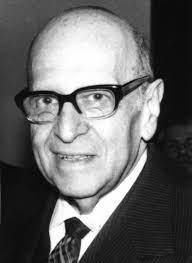Horkheimer, Max

Bio: (1895-1973) German sociologist. Max Horkheimer received his doctorate and habilitation from the Goethe University Frankfurt, and in 1930 he became director of the Institute for Social Research in Frankfurt (the Institute itself was founded in 1924). Later, this Institute and the philosophical and ideological orientation he nurtured, were named the Frankfurt School of Critical Theory. The institute advocated a critical and interdisciplinary approach. The institute published the Zeitschrift für Sozialforschung (Journal of Social Research), which was launched in 1932. The following year, due to the Nazis coming to power, Horkheimer moved the Institute and the magazine to the United States, where he connected the Institute with Columbia University. After the end of the Second World War, Horkheimer returned to Frankfurt, where he re-founded the Institute in 1950.
Horkheimer is one of the most important representatives of the Frankfurt School. He coined the term "critical theory", and this theory is a key feature of the work of the entire Institute. In his early works, the most important of which is Traditional and Critical Theory (1937), the author deals with the problem of science. He critically studies the methodological, theoretical, and practical aspects of science. Horkheimer rejects both positivist and pragmatic views on science because they do not pay enough attention to the social crisis and the problems of human existence. Science is neither capable nor ready, in a period in which there are social problems and economic crises, to deal with the elimination of social misery. Scientific truth cannot be separated from moral questions, so bourgeois science itself acts as an ideology. Scientific perception is always mediated by social categories, and those categories lead to the "reification" of society. Critical theory, in contrast, is conceived as an autonomous practice that should transform culture and society. Autonomous practice is guided by emancipatory principles, that is, that strives to achieve universal and authentic emancipation of all people, regardless of class and group interests. Only in such a rational world, free from reification is it possible for science to be guided by the principles of positivist science.
In his first book, Authority and the Family (published in German in 1936), Horkheimer deals with the way society reproduces itself. He explores how the relationship between authority and cultural values leads to subordinate strata of society accepting their own subordinate position. The main role in reproducing these values and maintaining the status quo is not physical force, but social institutions such as the family, church, and school. These institutions, which work together, strengthening each other, are accepted by the people, and then they shape the character traits of the people, the most important of which is submission to authority. Authority is the one that plays a key role in the process in which people passively accept their destiny as a given. Horkheimer believes that the family is the basic unit of society, not the class. The authority that family and marriage have continues to enable a man to dominate a woman and demand her obedience. In culture, too, there are relations of authority. In the field of politics, the relations of authority and domination are much more influential than the ideas of freedom and equality. The Machiavellian approach has become dominant in European politics. Calvinism shifted the idea of utopia to "the other world" while propagating discipline and control in this world.
In the book Dialectics of Enlightenment (1972, in German 1947b), co-written with Theodore Adorno, the authors explore the history of bourgeois society and culture, primarily in the context of the Enlightenment ideas of science and humanism. The Enlightenment is the product of a dialectical relationship between the ideas of freedom, justice, and personal autonomy, on the one hand, and the values of positive science focused on measurements and exactness, as well as pragmatism and utilitarianism, in order to control nature, on the other. The Enlightenment was a period in which the preconditions of "totalitarianism" emerged because the principles of positive science were applied to exert control over society. These principles led to the spread of ideas and practices of order, control, and domination, while at the same time eliminating mythical thinking and subjectivity. In the modern society of advanced capitalism, proletarian revolutions have not taken place.
The authors see the mass culture that spreads conformism and controls social consciousness as the main reason for this development. They called this form of control over the masses "culture industry." The culture industry dominates all forms of mass culture; the mass media sell artistic values as commodities; democracy is characterized by parties that control the masses through their programs and propaganda; consumer products are standardized and eliminate the need for individual consumer tastes. In Western culture, as a consequence of the Enlightenment, the instrumental form of formal rationality dominates, and the goal of that rationality is to achieve control over human action and society, through dehumanized science and technology. Capitalist societies, through the culture industry and dehumanized science and technology, destroy any real opposition by either assimilating or neutralizing it. In these societies, all models of social communication become monolithic and lead to cultural indoctrination. Modern society is becoming an iron cage of total administration, consumerism, and resignation.
Fields of research
Authority Capitalism Character, Social Church Communication Consumerism Control, Social Crisis Crowd Culture Democracy Domination Family Freedom History Ideology Industry Media Morality Parties, Political Poverty Propaganda Rationality Science Technology Utopia AlienationTheoretical approaches
Critical Theory (Frankfurt School)Main works
Studien über Autorität und Familie: Forschungsberichte aus dem Institut für Sozialforschung (1936);
Traditional and Critical Theory (1937);
Eclipse of Reason (1947a);
Dialektik der Aufklärung (1947b);
Soziologische Exkurse (1956);
Critique of Instrumental Reason (1967);
Critical Theory: Selected Essays (1972);
Gesellschaft im Übergang: Aufsätze, Reden und Vorträge 1942–1970 (1972);
Dawn & Decline: Notes 1926-1931 and 1950-1969 (1978).
Works translated into English:
Dialectics of Enlightenment (1972, in German 1947b).

